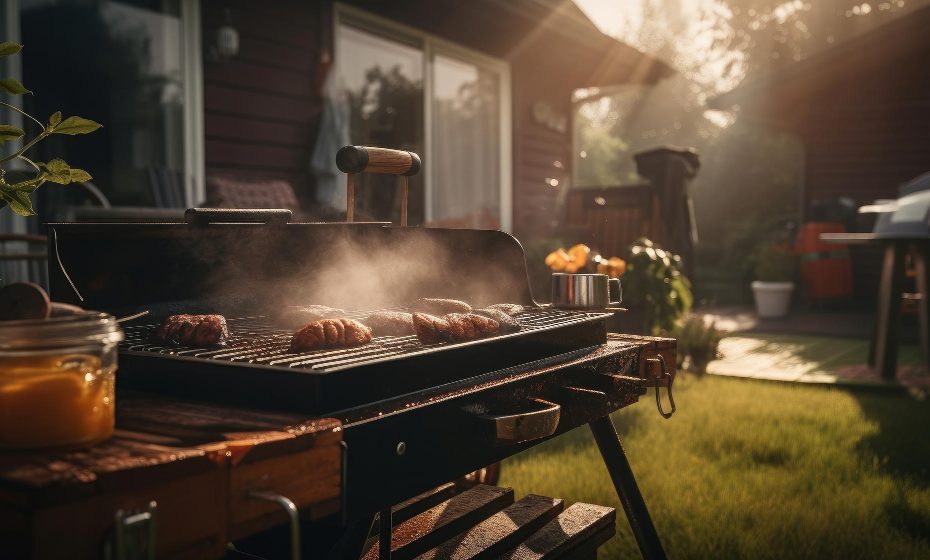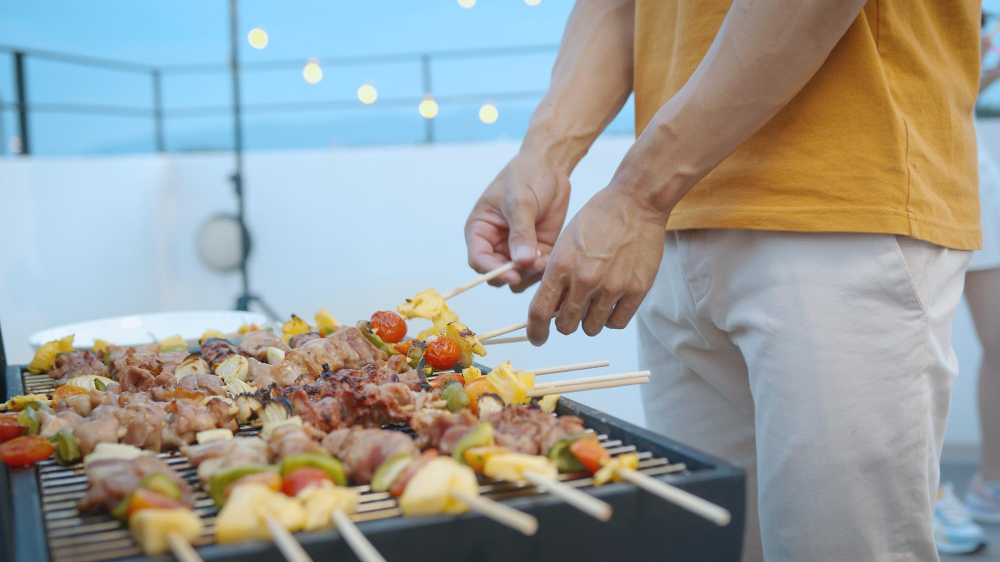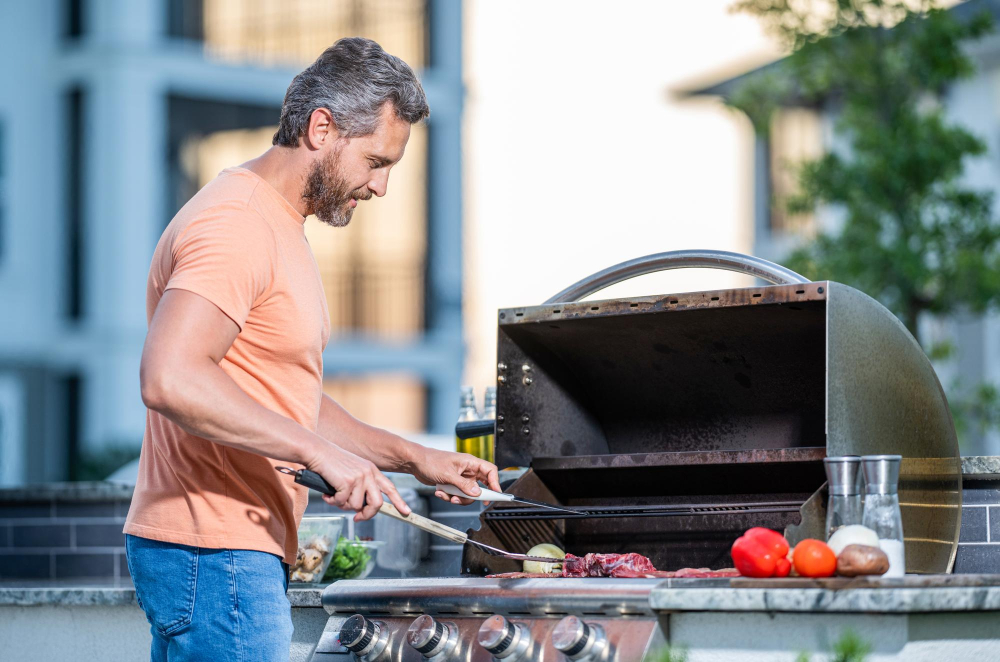Is cooking on gas BBQ healthy?
Barbecuing is a popular cooking method, especially in the summer months when people enjoy spending time outdoors. Gas BBQs have gained popularity due to their convenience and ease of use. However, there has been ongoing debate about whether cooking on a gas BBQ is healthy or not.
The Benefits of Gas BBQs
Gas BBQs offer several advantages over other types of BBQs. First and foremost, they are incredibly convenient. You can start cooking almost immediately after turning on the gas, without the need to wait for coals to heat up like with a charcoal BBQ. This makes gas BBQs perfect for impromptu gatherings or quick weeknight meals.
Another benefit of gas BBQs is that they provide better temperature control. You can easily adjust the heat by turning a knob, allowing you to cook food evenly and precisely. This is particularly important when grilling delicate foods like fish or vegetables, where precise control over the cooking temperature is crucial.
The Health Aspect
Now let’s address the main question – is cooking on a gas BBQ healthy? The answer is subjective and depends on various factors.
- Reduced exposure to harmful substances: Compared to charcoal grilling, gas BBQs produce fewer harmful substances such as polycyclic aromatic hydrocarbons (PAHs) and heterocyclic amines (HCAs). These compounds are formed when fat drips onto hot coals, creating smoke that can contain carcinogens. Gas BBQs eliminate this risk, resulting in reduced exposure to potentially harmful substances.
- Less smoke: Gas BBQs produce less smoke compared to charcoal BBQs. While the aroma of charcoal grilling is undeniably enticing, excessive smoke can be a nuisance, especially for individuals with respiratory issues. Gas BBQs provide a cleaner and more pleasant grilling experience in this regard.
- Food safety: Proper cooking temperatures are essential to kill bacteria and ensure food safety. Gas BBQs offer better temperature control, allowing you to cook food thoroughly and reduce the risk of foodborne illnesses.
However, it’s worth noting that there are also potential health concerns associated with gas BBQs.
“One consideration is the generation of potentially harmful compounds when fats and juices from meat come into contact with the hot cooking grates.”
Minimizing Potential Risks
To minimize potential risks when cooking on a gas BBQ, here are a few tips:
- Clean the grill regularly to prevent the buildup of grease and residue, which can lead to flare-ups.
- Avoid charring or burning food, as it can create carcinogenic compounds. Use marinades or rubs to add flavor instead.
- Consider using foil or a grilling basket to prevent direct contact between the flames and the food, reducing the chances of harmful substances being formed.
The Bottom Line
Cooking on a gas BBQ can be a healthy and convenient option, especially when compared to other outdoor cooking methods. The ability to control temperatures, reduced exposure to harmful substances, and improved food safety make gas BBQs a popular choice for many. However, it’s important to take precautions and adopt safe grilling practices to minimize any potential risks.
Which is Healthier: Gas or Charcoal Grill?
When it comes to outdoor grilling, the debate between gas and charcoal grills has been ongoing for years. Both options have their own set of advantages and disadvantages, but when it comes to health, one may be a better choice than the other. Let’s take a closer look at which grill option is healthier: gas or charcoal.
Gas Grills
Gas grills are convenient and easy to use, making them a popular choice among many grill enthusiasts. They offer precise temperature control and quick heating, allowing you to start cooking in no time. From a health perspective, gas grills have some advantages:
- Less Fat: Gas grills typically have drip trays that collect excess fat, reducing the risk of flare-ups and charring, which can produce harmful substances.
- Lower Emission of Carcinogens: Gas grills produce lower levels of carcinogens, such as polycyclic aromatic hydrocarbons (PAHs) and heterocyclic amines (HCAs), compared to charcoal grills.
Charcoal Grills
Charcoal grills are known for providing an intense smoky flavor and are often the preferred choice for traditionalists. However, there are some potential health concerns associated with charcoal grilling:
- More Carcinogens: Charcoal grilling produces more PAHs and HCAs, which are formed when fat drips onto hot coals or charcoal briquettes. These substances can be harmful when consumed in large quantities.
- Higher Risk of Charring: The high temperature and direct heat of charcoal grills can lead to charring, which has been linked to an increased risk of cancer.
While gas grills have a slight advantage in terms of health, it’s important to remember that occasional use of a charcoal grill is unlikely to cause significant harm.
To minimize potential health risks when using a charcoal grill, you can follow these tips:
- Cook leaner meats with less fat content.
- Precook meat partially to reduce grilling time.
- Avoid flare-ups by trimming excess fat and using drip pans.
Ultimately, the choice between gas and charcoal grills depends on personal preference and convenience. While gas grills may be a healthier option, proper grilling techniques and moderation can help mitigate the potential risks associated with charcoal grilling. So, fire up your preferred grill and enjoy a delicious outdoor cooking experience!
Is cooking on a propane grill healthy?
Propane grills have become increasingly popular among outdoor cooking enthusiasts in the UK. They offer convenience, quick heating, and easy temperature control. However, there has been some concern about the health implications of cooking on a propane grill. Let’s delve into this topic and explore whether cooking on a propane grill is healthy or not.
Propane Grill Basics
A propane grill uses propane gas as its fuel source. Propane is a clean-burning fuel that produces minimal smoke or soot. This makes it a popular choice for those who prefer a cleaner grilling experience compared to charcoal grills. Propane grills also allow for precise temperature control, which can help cook food more evenly.
The Potential Health Risks
There are two main concerns when it comes to the health risks associated with cooking on a propane grill: the production of carcinogenic compounds and the inhalation of potentially harmful fumes.
1. Carcinogenic Compounds: When fat and juices from food come into contact with the high heat of a propane grill, they can produce heterocyclic amines (HCAs) and polycyclic aromatic hydrocarbons (PAHs). These compounds have been linked to an increased risk of cancer. However, there are ways to minimize their formation, such as by using marinades, avoiding charring, and removing excess fat from meat before grilling.
2. Inhalation of Fumes: Propane grills emit carbon monoxide and other gases while in use. It’s important to ensure proper ventilation when grilling to prevent the buildup of these gases, which can be harmful if inhaled in high concentrations. Always use your propane grill in an open or well-ventilated area.
Tips for Healthy Grilling
While there are potential health risks associated with cooking on a propane grill, there are steps you can take to minimize them:
- Clean your grill regularly to prevent the buildup of grease and debris that can contribute to the production of harmful compounds.
- Precook your meat partially in the oven before finishing it on the grill. This reduces grilling time and, therefore, lowers the potential for the formation of HCAs and PAHs.
- Use a meat thermometer to ensure that your food reaches a safe internal temperature, reducing the risk of foodborne illnesses.
Propane grilling can be a healthy cooking method if practiced safely and in moderation. By following proper grilling techniques and taking necessary precautions, you can enjoy delicious grilled food while minimizing potential health risks.
What are the disadvantages of cooking with propane?
Propane has become a popular choice for cooking in the UK due to its efficiency and convenience. However, like any other fuel source, there are also some disadvantages to consider. Here are a few drawbacks of cooking with propane:
1. Safety Concerns
While propane is generally considered safe when handled properly, there are risks associated with it. Propane is highly flammable, and mishandling or improper installation of propane appliances can lead to leaks or even explosions. It is crucial to follow safety guidelines and have regular inspections to prevent any accidents.
2. Limited Availability
In some rural areas, accessing propane may be more challenging compared to other fuel sources. The limited availability of propane suppliers can create inconvenience and potentially increase delivery costs. It is important to ensure a reliable propane supply before committing to cooking with this fuel.
3. Environmental Impact
Propane combustion produces carbon dioxide (CO2), contributing to greenhouse gas emissions. While propane burns cleaner than other fossil fuels like coal or oil, it still adds to the overall carbon footprint. As environmental concerns grow, individuals are increasingly looking for more sustainable alternatives for cooking.
“Propane combustion produces carbon dioxide (CO2), contributing to greenhouse gas emissions.”
4. Cost
Cooking with propane can sometimes be more expensive compared to other fuel options. The cost of propane can fluctuate depending on factors such as demand, supply, and transportation fees. Additionally, propane appliances may require specific maintenance or repairs, which can add to the overall expense.
5. Limited Heat Control
Compared to electric stoves, propane cooktops can be more challenging to control the heat levels. Propane flames can be intense and may not provide the same level of precision as electric or gas cookers. Mastering the art of cooking with propane may take some practice and adjustment.
In conclusion, while propane offers many advantages for cooking, it is important to be aware of its disadvantages too. Safety concerns, limited availability, environmental impact, cost, and limited heat control are all factors to consider when deciding whether to use propane for cooking in your UK home.
- Safety Tip: Always ensure proper ventilation when using propane appliances to reduce the risk of carbon monoxide poisoning.
- Environmental Consideration: If you are concerned about the environmental impact of propane, consider exploring alternative fuel options such as induction cooktops or solar-powered cooking devices.
- Cost-Saving Tip: Compare prices of different propane suppliers to ensure you are getting the best deal, and consider energy-efficient appliances to minimize fuel consumption.
Is grilling with gas bad for your health?
Grilling is a popular cooking method, especially during the summer months when barbecues become a regular occurrence. However, there has been some concern over the health effects of grilling with gas. Let’s take a closer look at whether or not grilling with gas is bad for your health.
Gas grills versus charcoal grills
When it comes to grilling, there are two main options: gas grills and charcoal grills. Gas grills use propane or natural gas as fuel, while charcoal grills burn charcoal briquettes. While both methods have their pros and cons, gas grilling is generally considered to be a healthier option.
Gas grills produce less smoke compared to charcoal grills, which means there is a lower risk of inhaling harmful chemicals. Charcoal grilling can potentially release carcinogens, such as polycyclic aromatic hydrocarbons (PAHs) and heterocyclic amines (HCAs), into the food. These compounds have been linked to an increased risk of cancer.
Healthier grilling practices
To minimize any potential health risks associated with grilling, whether using gas or charcoal, there are a few steps you can take:
- Precook meat: Partially precooking meat before grilling can help reduce the formation of HCAs and PAHs.
- Marinate meat: Marinating meat in herbs, spices, and acidic ingredients like lemon juice or vinegar can also help reduce the formation of harmful compounds.
- Keep the grill clean: Regularly cleaning your grill can prevent the buildup of carbonized grease, which can potentially transfer harmful chemicals to the food.
- Choose lean cuts of meat: Trim excess fat from meat before grilling to reduce the risk of flare-ups and charring.
Conclusion
While grilling with gas is generally considered to be a safer option compared to charcoal grilling, it is still important to follow healthier grilling practices to minimize any potential health risks associated with the cooking method.
By taking simple steps such as precooking meat, marinating it, keeping the grill clean, and choosing lean cuts, you can enjoy delicious grilled meals while minimizing exposure to harmful compounds. Remember, moderation is key, so enjoy your grilled favorites in moderation as part of a balanced diet.



